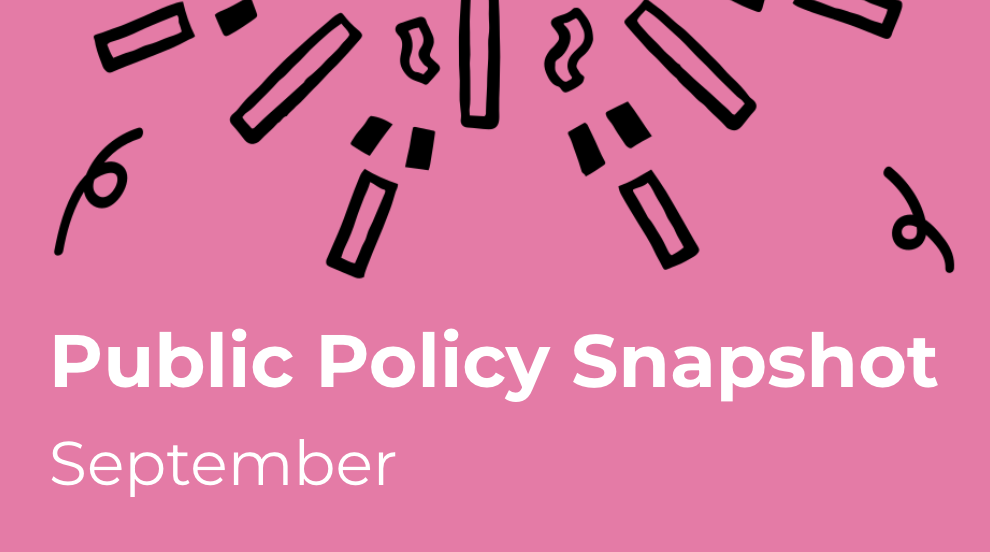
Welcome to the “Don’t Blink” series! Every month we share developments from around the world that shape people’s ability to participate in the free knowledge movement. In case you blinked this month, here are the most important topics that have kept the Wikimedia Foundation’s Global Advocacy team busy.
To learn more about our team and the work we do, join one of our monthly conversation hours, follow us on Twitter (@WikimediaPolicy), sign up to our Wikimedia public policy mailing list, or visit our Meta-Wiki page.
________
Asia and Australia
Global Network Initiative’s Analysis of Australian industry code: Ellen Magallanes, Senior Counsel, and our Lead Public Policy Specialist for Asia provided input for the Global Network Initiative’s analysis of Australia’s industry code for online safety emphasizing the importance of defending free knowledge to foster a robust internet ecosystem in the country.
United States
Journalism Competition and Preservation Act (JCPA): The Foundation signed onto a coalition letter expressing strong concerns about the JCPA, which would require large online platforms to negotiate with groups of news organizations to pay them for access to their content. We deeply appreciate that Senator Klobuchar specifically carved out non-profits from the requirements to negotiate, which will protect public interest platforms like Wikimedia. Nonetheless, we remained concerned about the proposed legislation, including about “must-carry” rules for content generated by “news organizations” that are members of the cartels with which platforms would have to negotiate. The bill passed through the Senate Judiciary Committee on 22 September. A few Senators expressed concerns about the bill at markup which will need to be worked out before the bill moves to a vote on the Senate floor.
Latin America and the Caribbean
Comments to a draft bill on data protection in Argentina: The Foundation submitted comments in the public consultation for updating the Personal Data Protection Law (the “draft bill”) of the Argentine Agency of Access to Public Information. In our comments, we submitted proposals regarding: (1) the need to improve the clarity of the scope of the proposed journalism and public interest exemptions, as well as the anonymization requirements; and (2) the requirements to appoint local representation, a Data Protection Delegate and the 10-day term for complying with data subject rights due to a heavy burden these place on non-profit entities. We also expressed our concern about the possibility of an unintended setback to the Argentine Supreme Court of Justice’s precedent against a right to be forgotten, as it could have practical implications by preventing access to public interest knowledge.
Additional Developments
TrustCon 2022: Amalia Toledo, Lead Public Policy Specialist, participated in a panel discussion and interactive session at TrustCon in Palo Alto, California on 29 September, titled Context and Localization in Content Governance, from Algorithmic-Driven to Decentralized Platform. The speakers discussed the role of context and localization in content governance, and the implications of content governance on civic space and human rights, particularly, in the Global South. The session had an interactive portion where attendees collectively explored opportunities for rights-based content moderation, including the responsibilities and organizational models of platforms to govern content in the context of emerging technologies.
Community Conversation Hour on Anti-Surveillance work: The Global Advocacy team hosted its monthly conversation hours on 24 and 27 September to discuss anti-surveillance approaches within the free knowledge movement. On 24 September the guest speaker was Andri Humardhani, President of the Board of Wikimedia Indonesia. On 27 September there were two speakers: Pépe Flores, president of Wikimedia México, and Kate Ruane, Lead Public Policy Specialist for the US. All presentations are available here.
Announcements from our Team
Confirmed Session at East and Southeast Asia and the Pacific (ESEAP) Conference: The Global Advocacy team’s session was accepted at the ESEAP Conference in Sydney, Australia. Our Lead Public Policy Specialist for Asia will attend the conference on 18–20 November.
Call for Feedback on Conversation Hour Pilot: The Global Advocacy team has opened a call for feedback about the monthly conversation hours pilot that ran from June–October 2022. This series has been a pilot program to explore how our team can create a space to regularly share updates and learn from affiliates and volunteers. We want to improve how we do this in 2023. Feedback from Foundation staff, affiliates, and volunteers can be provided via the Movement Strategy and Governance forum, event talk page, or by emailing Ziski Putz, Movement Advocacy Manager (fputz@wikimedia.org).
ICYMI—New resource to support collaboration: Meta-Wiki FAQ: The Global Advocacy team published a ‘Frequently Asked Questions’ (FAQ) resource on Meta-Wiki. It clarifies the Foundation’s public policy priorities, who works on what, and much more. Check it out and let us know what you think. We are collecting feedback via the Talk page, emails to Ziski (fputz@wikimedia.org), or comments on the Movement Strategy Forum.
ICYMI—Help us combat disinformation: We launched a public mapping project to counter disinformation. The Foundation needs your help to compile all the initiatives and tools that have been developed at the local level across Wikipedia projects, so that we can share them with the entire movement and support each other better. If you are aware of any initiative, tool, training, or other form of community engagement around misinformation, disinformation, or information integrity, please let us know. Send an email with the subject “disinformation mapping” to Ziski (fputz@wikimedia.org), and note the time zone in which you are based.
Follow us on Twitter, check our Meta-Wiki, or join our mailing list for updates. We hope to see you there!

Can you help us translate this article?
In order for this article to reach as many people as possible we would like your help. Can you translate this article to get the message out?
Start translation